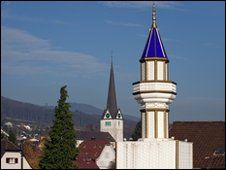 Some two months ago I met in Cairo a group of Swiss media persons who were preparing a TV programme on Christianity in the Middle East. It was normal that our conversation would run on the theme of freedom of belief in Egypt, especially regarding the freedom to conduct religious rites and build churches.
Some two months ago I met in Cairo a group of Swiss media persons who were preparing a TV programme on Christianity in the Middle East. It was normal that our conversation would run on the theme of freedom of belief in Egypt, especially regarding the freedom to conduct religious rites and build churches. Later the conversation—off the record—turned to the controversy that was then raging through Switzerland on the issue of banning minarets on mosques. The Swiss were divided between unqualified support for religious freedom and alarm regarding the escalating political Islamic movement.
When asked for my opinion on the issue, I replied that I was neither familiar with the details of political Islam in Europe nor with its direct impact on the banning of minarets—given that already existing mosques are allowed to remain and the construction of new mosques is possible. I was, however, uncomfortable with the fact that a moderate, non-aligned State such as Switzerland might find itself dragged into the circle of struggles so rampant in our region. These struggles give rise to rampant intolerance, curtailed religious freedom, and the reduction or outright loss of the right of minorities to practice their religious rights.
Last week saw 57.5 per cent of the Swiss vote for the banning of minarets, a vote which will necessitate a constitutional amendment. Worth noting is that the Swiss government was against the ban, but the result of the referendum must be respected. Amid allegations of curtailing religious freedoms, the ban has brought upon Switzerland international censure and concern about possible economic retaliation.
Apart from the international reaction to the Swiss vote, it is of particular interest to explore the local reaction to it. The overwhelming rejection, condemnation, and protest took me by surprise. Granted, the Swiss vote warrants the criticism and rejection of democratic communities in which unqualified equality and freedom prevail. But that the scathing criticism and rejection should arise so harshly from a community which masters the art of religious discrimination, curtails religious freedom, and studiously hinders the building of places of worship is a matter which surpasses reason.
Egypt’s mufti Dr Ali Gomaa declared his condemnation and denouncement of the Swiss ban, describing it as an assault on religious freedom and an insult to Muslim sensibilities—this in a country where the building of mosques is unrestricted and the right of Muslims to pray is secure. Obviously Dr Gomaa does not spare a thought to the fact that in Egypt the disparity between the building of mosques and churches is all too wide. Beginning with the purchase of the land; the building permits required; the approvals for restoration, renovation, expansion, demolition, or rebuilding; all are absolutely facilitated in the case of mosques and made as difficult as can be in the case of churches. And as though this were not enough, churches and buildings affiliated to them, as well as Coptic-owned houses and property are constantly attacked by outlaw mobs. Add to this the failed attempts of the National Council for Human Rights for the third year in a row to place the bill for the unified law for building places of worship on Parliament’s agenda and a grim picture evolves. The picture is even more grim in case of churches in rural districts where Christians have to pray in ‘churches’ that are no more than tiny rooms in buildings which bear no resemblance whatsoever to any image of church. The idea of a church dome or tower which bears a cross or houses a bell seems like an all but impossible dream. The facts on the ground—many of which other writers and I have cited in countless previous articles—are known to all.
Without the merest attempt to put our house in order, are we in any position to taunt others to put theirs in order?




